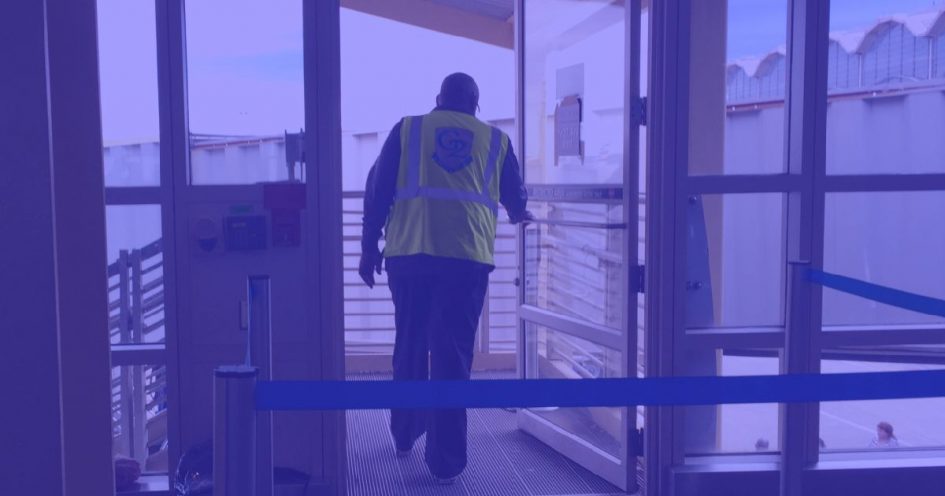Airlines and airports owe all passengers quality services, which includes a safe and secure traveling experience. A trained workforce to handle emergencies and properly maintained equipment for passengers with disabilities are the basic building blocks of having inclusive, smoothly operating, 21st century airports for all.
“Airlines are a multi-billion dollar industry. We need them to commit to investing in public safety.”
-Captain LaPonda J. Fitchpatrick
Both airlines and airports have a duty to ensure that passengers enjoy a travel experience that is safe and secure. But the airlines’ system of low-bid contracting is hurting working people and putting both passengers and airport workers at risk.
Better pay reduces turnover and improves airport security. Airports across the country, including LAX, SFO, FLL, and BOS, already recognize this and are calling for a whole community approach to emergency management, emergency response, and training. Passenger service workers are an integral part of that plan.
Airport workers have reported that poor communication and a lack of emergency response training have heightened confusion during crises, which have come with startling frequency. In August, 2016, widespread panics set off by suspected shooting incidents plunged both John F. Kennedy and Los Angeles International Airports into chaos, during which passengers and workers alike fled onto active tarmacs and roadways. These were ‘false alarms.’ But passengers and employees weren’t so fortunate at LAX in November 2013, when a gunman shot and killed Gerardo I. Hernandez, a Transportation Security Officer (TSO). Nor at Brussels, in March 2016, when terrorists detonated a bomb at Zaventem International Airport. Nor at Ft. Lauderdale’s airport in January 2017, when a passenger fired a weapon he drew from his checked luggage, killing five and wounding six.
Passengers with disabilities face greater risks than others during emergencies, when an airport service worker may be their only hope to get to safety. Yet, in a recent report on wheelchair services at JFK and LGA, wheelchair attendants reported that they are unaware of how to respond to an emergency or how to assist a passenger with disabilities evacuate the terminal if necessary.
Alongside law enforcement and emergency personnel, service workers can play an important role in public safety. That’s why it’s important for airport authorities AND the airlines that hire these passenger service contractors, to mandate meaningful, hands-on, emergency preparedness training, and ensure wages and benefits that will retain experienced staff.
Equipping thousands of airport workers—who are in direct contact with passengers every day—to respond in cases of extreme weather, active shooters, or terrorist attacks is smart policy. Making sure these trained, experienced airport workers stay on the job is even smarter.
Emergency Response Training for Passenger Service Workers:
 “It’s airport service workers that end up being the first responders to emergencies. So it would be in the interest of the airport to have a training for airport service workers to be aware of what to do during a crisis, like an active shooter or some kind of natural disaster. I think it’s safer for us and for the traveling public.”
“It’s airport service workers that end up being the first responders to emergencies. So it would be in the interest of the airport to have a training for airport service workers to be aware of what to do during a crisis, like an active shooter or some kind of natural disaster. I think it’s safer for us and for the traveling public.”
-Tim Maddox, Wheelchair Agent, Los Angeles International Airport
LAX learned from the 2013 shooting and is taking important steps to ensure airport safety. With the backdrop of even more recent security scares at New York’s JFK and Los Angeles International airports, which prompted panic and evacuations, LAX—the nation’s second busiest airport—in a groundbreaking partnership with the Service Employees International Union-United Service Workers West (SEIU-USWW), Building Skills Partnership (BSP), and airline contractor G2, trained over 100 front-line G2 airport service workers to respond effectively in any type of emergency situation.
SEIU USWW, in ongoing partnership with BSP is developing a pilot training program for passenger service workers in areas such as: observation skills and maintaining situational awareness, stakeholder communications, emergency/critical incident response and evacuation and differentiating among emergency personnel by identifying among different types of “first responders.”
The new training program parallels the emergency-response management method advocated by the Federal Emergency Management Agency (FEMA) called the “Whole Community Approach.” This approach recognizes that private-sector individuals and organizations can play important roles during emergencies. The approach is based on three principles: understanding the needs of the community, engaging and empowering all parts of the community, and strengthening what works on a daily basis.
The training program also helps service providers comply with requirements of their Certified Service Provider Program (CSPP) License Agreement that allows them to operate and conduct business at LAX. The CSPP establishes minimum standards that include emergency preparedness, LAX rules and regulations, compliance officer, training requirements and minimum staffing, customer service, equipment and motor vehicles, administrative requirements, labor harmony language, and applicable contractor responsibility program requirements.
“The airlines and other tenants at LAX contract thousands of workers to provide passenger and aircraft services. They are valued members of the LAX community,” said LAWA Chief Executive Officer Deborah Flint. “Training these workers provides them with skills to keep themselves safe during an airport emergency, to directly assist passengers, and to contribute to the overall emergency response and recovery.”
San Francisco International Airport (SFO) took steps before 9/11 to improve the skills and experience of all airport workers by launching the Quality Standards Program (QSP), a partnership between the airport, airport workers’ unions, and their employers. The program establishes wage and benefits standards for service employees; the freedom to form a union; standards for training and equipment; whistleblower protections and a means for the airport authority to audit contractor compliance. The partnership also provides a path to higher wages for experienced workers.
Making Airports Accessible for All
Nearly one in every five Americans has a disability, and that number is expected to grow as the number of people over age 65 increases. Millions of Americans with disabilities travel by air every year.
Under the federal Air Carrier Access Act (ACAA), they have a right to travel free of discrimination or exclusion. Yet many airline passengers with disabilities are not getting the treatment they deserve, often as a consequence of low-bid contracting for essential airport support services.
Passengers with disabilities commonly request assistance in moving through an airport and to get on and off their plane. Airlines provide these services using a mixture of in-house employees and contracted workers. A passenger with a disability could receive assistance from employees of as many as three different companies on a single nonstop flight.
Passengers have reported increasing difficulty in accessing the quality services they require. Since 2004, complaints to airlines by passengers with disabilities have more than doubled from approximately 11,500 to more than 27,000. The 139 percent increase in disability-related passenger complaints far outpaced the increase in overall passenger traffic, which was only 11 percent over the same period, but generally tracks the increase in outsourcing of passenger services work.
The ACAA mandates that employees providing disability services be trained to proficiency to provide air travel services in a manner that safeguards the safety and dignity of passengers. All too often, companies contracted by airlines to perform these vital services fail to meet expectations.
Without sufficient standards or oversight in place for training, equipment, wages and benefits, low-bid contracting ends up incentivizing contractors to cut corners, which in turn can cause safety and capacity issues. Worker effectiveness is compromised by the poor training, low wages, and high turnover long-associated with outsourced service jobs.
